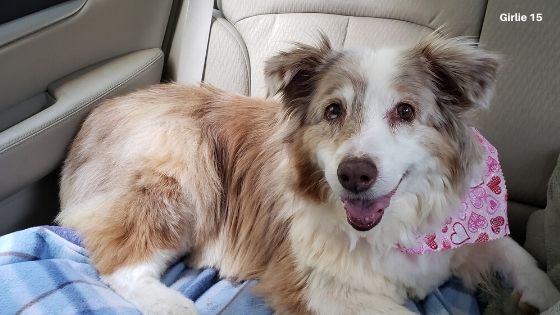
It’s reasonable to assume that as pups age they will stop coming into heat, or season as it’s also called.
I mean, human females stop experiencing periods so why not dogs too?
Since dogs don’t experience the same reproductive trajectory as humans, I wrote this helpful post for senior dog parents.
Do Female Dogs Go Through Menopause?
There is no period in the dog’s reproductive cycle that could be called or be similar to menopause as it happens in women.
Dogs can continue to go into heat and subsequently become pregnant throughout their lives.
However, as female dogs age, their reproductive cycles become less regular, and the frequency and intensity of heat cycles decrease, and the release of eggs may be more sporadic.
According to veterinarian Dr. Ivana Vukasinovic,
“This roughly means that females between the ages of 8 to 9 years (small breeds of dogs), and after 6 years (for large breeds of dogs) have an extremely low probability of fertilization.”
Therefore, yes, a 10 year old dog can be in heat and therefore get pregnant.
Please note that while female dogs may experience less frequent and intense heat cycles, they should not stop alltogether.
If your dog does, a trip to the veterinarian is in order because it could signal an underlying health condition or metabolic disease process.
Also, just because dogs can get pregnant as seniors doesn’t mean they should. Please see the section below on health risk for pregnant senior dogs.
How to Tell if Your Old Dog is in Heat?
Although female dogs can go into heat throughout their life, signs aren’t always as obvious by old age, which is why dog owners may assume their senior pup is past the point where they can get pregnant.
Signs your dog is in heat:
- Peeing more often
- Marking
- Discharge (at first it may be bloody, then become watery and pinkish)
- Swollen vulva
- Excessively licks her genitals
- Nervous/distracted/aggressive
- Raising her rear towards male dogs
- Actively courts males
- Changes in tail position
In old dogs, some of these common signs can indicate a serious health issue.
For example, while peeing more often is a sign of a dog in heat, in an older dog it can indicate kidney disease, diabetes or Cushing’s.
It also may be possible your dog isn’t peeing more, but rather cannot wait to go outside like she used to.
That could be due to dementia where she forgets her housetraining, or a urinary tract infection (UTI).
Signs of anxiety, nervousness or even aggression can also be present when a dog is dealing with some vision or hearing loss, experiencing separation anxiety (common in senior dogs), has developed or in the beginning stages of dementia or is in pain.
An increase in urination and pus from the vulva may mean your dog has pyometra, an infected womb.
That’s why it’s so important to take your senior dog to the vet whenever you notice any physical or behavioral changes.

The Four Stages of a Heat Cycle
Heat is the stage during a female dog’s reproductive cycle when she is receptive to mating.
There are 4 stages to every head cycle.
Proestrus
This is the start of the heat cycle, and the stage when most dog parents notice changes.
This stage lasts for an average of 9 days, but can range anywhere from 0-27 days.
This is the stage of the heat cycle when males dogs will be attracted to the female, but she will not be receptive.
The estrogen levels will peak and the follicles will develop.
The vulva will usually be swollen with a blood-tinged discharge.
Estrus
This is the phase when your dog will be receptive and ready to mate and when the fertile period occurs.
She’ll approach males but will be aggressive to females.
This stage will last an average of 9 days based on behavioral signs, but can range from 4 to 24 days.
During this stage, the vulva is enlarged and softens a little, there is a decrease in the blood in the vulvar discharge and estrogen levels are dropping and progesterone levels are starting to increase.
Diestrus
This phase lasts approximately two months and happens right after estrus.
During this time your dog’s body is either getting back to normal or is pregnant.
Estrogen levels are low, while progesterone peaks 3 to 4 weeks after the start of diestrus and then declines to basal levels by the end of diestrus.
This increase and then decrease in progesterone will occur regardless of if the dog is pregnant.
Anestrus
This is the time between diestrus and the next proestrus, and lasts roughly four months.
The vulva is no longer swollen and there is no vaginal discharge.
The body uses this time to allow the uterus to prepare for the next possible pregnancy.
Note: This information is courtesy of East Central Veterinary Hospital
How Often Will an Old Dog Go into Heat?
A younger dog will typically go into heat every six months, but it can vary depending on size of dog and breed.
In an old dog, the length of time between heat cycles will increase.
It’s impossible to say exactly how often a senior dog will go into heat because there are a lot of factors involved such as size, genetics, and overall health.
Some older female dogs may continue to have heat cycles, but they may only occur once a year or less frequently.
While not common, it is possible for a senior dog to stop having heat cycles altogether, which is known as estrus cessation.
Are There Health Risks if an Old Dog is Pregnant?
Pregnancy itself is risky for an old dog.
There are often more complications with a senior dog pregnancy.
Some old dogs may have health issues that have gone undetected and which you do not know about yet.
There is an increased chance of complications due to those underlying conditions should an old dog get pregnant.
Even if she is not pregnant, unfixed female dogs are at great risk of developing some very serious health issues such as pyometra and mammary or breast cancer.
According to PetMD, “dogs that get pregnant over 8 years of age are more at risk of developing pyometra, which is a life-threatening disease”.
Can I Stop My Old Dog from Going into Heat?
Since now you know that an old dog continues to have heats and can still get pregnant, but that doing so is risky for your senior dog’s health, you may be wondering if and how you can stop your dog going into heat in the first place.
Yes, you can by having her spayed.
Spaying an older dog will also greatly reduce the risk of mammary tumors because they are caused by hormones produced by the ovaries.
Is it Safe to Spay an Older Dog?
Advances in veterinary medicine mean surgery is safer than ever, but of course it’s not without risk, especially if your senior dog has some health issues.
Specifically, the anesthesia required for spay surgery can cause complications for senior dogs.
For more, read my article on anesthesia risks for older dogs.
If you want to stop your senior dog’s heats, have a chat with your vet.
He will explain what the procedure entails, extra steps that can be taken to keep your pup safe, and whether or not it is even the right decision to go ahead.
Conclusion
While old dogs don’t go through menopause like humans do, a female’s heats can become more irregular in infrequent, especially when a dog is older than 10 years of age.
Because of this unpredictably, it can be more difficult to notice when your senior dog is in heat.
Femal dogs can get pregnant throughout their entire lifetime though so it’s important to pay close attention so you can avoid getting your dog pregnant and the health risks associated with an old dog having babies.
To stop your dog’s heat cycles, and to guarantee she can’t get pregnant, consider having a spay surgery performed.
As a “bonus”, doing so can prevent a life-threatening uterine infection and help prevent mammary cancer.

I have two Dachshunds who are 12 years old and still go into heat. Hi have a new male Labradoodle they cannot get them pregnant. So I put them in a big crate together the two girls and let my male dog run around for about four hours and then put him in the cage and let my females run around. I would think at the age of 12 they would not still be going into heat.
Thankyou for sharing Female Dogs into heat! Our Female Goldendoodle is going on 12 years old and Spayed since we adopted her! She seems to be urinating alot recently! Has some times forgot to be left out the door! She barks when Mail arrives or my husband goes outside or comes back home! That’s normal for her! Hope doesn’t have UTI Good to read this page!